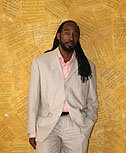D'Mar is like a nervous prom date. Sitting underneath the AmSouth escalator as refuge from the busier-than-usual Cups downtown on this early afternoon, I get comfortable in my chair and look across at Derrick Martin, 34, better known as D'Mar. His long dreadlocks rest on his left shoulder and back. He taps his fingers on the table and fumbles with a black press folder. "I'm more comfortable in front of a crowd than in one-on-one situations like this," he says.
It's true—D'Mar is at home on stage. He performs with electrifying intensity and sincerity. Vocals, uncomplicated and mellow, remain intact, despite the tremendous jumping and dancing both on and off the stage.
If what you want is a show, you'll get it with D'Mar. His concerts are filled with variety, from his own music to "Purple Rain"-era renditions like "Let Me Love You Down" by Ready for the World and "Glamorous Life" by Sheila E. He engages the audience with questions to the ladies and statements to the guys, and he peppers verse breaks with Prince-like meows.
It's evident in his music and stage performance that D'Mar is a huge Prince fan. "I come from liking artists that are really characters, that are not superficial. You knew what they were going through from their art," he says.
D'Mar is not new to the music business. Behind the scenes touring with Little Richard for the last 10 years as a drummer, D'Mar has cultivated quite a reputation not only as a master percussionist but also for producing, arranging and songwriting.
A Jackson native, D'Mar developed musically at an early age. "I started playing drums when I was 12," he says. He got his professional start as a senior at Provine High School, traveling not far around the corner to Jackson State University on a music scholarship, where he meshed into the Sonic Boom's famous drum section.
D'Mar calls himself the best-kept secret in the Dirty South. In 1995, he formed a production company, called Airtight Records, with a friend, Darryl Pete. He produced records and penned songs for artists like Eddie Seawood, Dorothy Moore, Children of the Cornbread, Wildlife Society, Compozitionz and Little Richard himself. "Little Richard has recorded two of my songs," he says.
D'Mar has performed at just about every major music event and awards show one could imagine, including the Grammys and the American Music Awards.
After so much time behind the drum set, D'Mar feels it's time to step out and bring his artistic abilities to the forefront. "I've written over 2,000 songs," he says. "For 10 years that was my day job. I figure, with the law of averages, out of 2,000 songs, I should have 500 hits," he says, laughing.
The songs D'Mar writes are reminiscent of the days when R&B and soul music was sexy but not overtly sexual like most records getting airplay today. Where does he get his inspiration? "Life," he says. "Life is inspiration. I live vicariously through other people. I'm a great observer."
His first offering, "The D'Mar Experience," is a double CD—both studio and live—of pure Nu Funk Soul, a term he copyrighted. "I want Jackson to know that funk is not a bad word," he says.
"I'd like to see more opportunity for diversity in the music industry, with D'Mar and the Nu Funk Society," he says. "We are a band that can deliver the whole experience and get the vibe that I'm trying to portray across," he says. "Consistency pays."
"Selling a record these days is all about the money—who has the most money to by the most advertising, marketing. I want to take it back to the live experience. There are not very many musicians left that can really take it to the stage. So that was where the Nu Funk Society came in, trying to create an experience for people to follow," he says.
D'Mar has other pots on the stove. He owns Percussive Music Studios in Clinton, where he and his wife, Faith, teach vocal and drum lessons. He does a lecture series for kindergartners through teenagers, tracing the history of the drum set in America. He starts with traditional New Orleans music and traces it all the way up to hip-hop.
"I drop a few important names like Duke Ellington during the process, and by the time they get to hip-hop, they realize it's not new but a culmination of things that have come before," he says. "As we are blessed, it's our responsibility to give back," he says.


